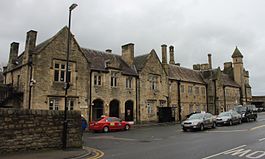Lancaster railway station
| Lancaster |
|
|---|---|
 |
|
| Location | |
| Place | Lancaster |
| Local authority | City of Lancaster |
| Coordinates | 54°02′53″N 2°48′25″W / 54.048°N 2.807°WCoordinates: 54°02′53″N 2°48′25″W / 54.048°N 2.807°W |
| Grid reference | SD472617 |
| Operations | |
| Station code | LAN |
| Managed by | Virgin Trains |
| Number of platforms | 5 |
| DfT category | B |
| Live arrivals/departures, station information and onward connections from National Rail Enquiries |
|
| Annual rail passenger usage* | |
| 2011/12 |
|
| 2012/13 |
|
| 2013/14 |
|
| 2014/15 |
|
| 2015/16 |
|
| History | |
| Original company | Lancaster and Carlisle Railway |
| Pre-grouping | London and North Western Railway |
| Post-grouping | London, Midland and Scottish Railway |
| 22 September 1846 | Opened as Lancaster Castle |
| 1902 | Remodelled |
| 5 May 1969 | Renamed Lancaster |
| National Rail – UK railway stations | |
| * Annual estimated passenger usage based on sales of tickets in stated financial year(s) which end or originate at Lancaster from Office of Rail and Road statistics. Methodology may vary year on year. | |
|
|
|
Lancaster railway station (formerly known as Lancaster Castle railway station) is a railway station that serves the city of Lancaster in Lancashire, England. It is one of the principal stations on the West Coast Main Line.
Originally known as 'Lancaster Castle Station' in order to distinguish it from the first Lancaster Station (1840–1849), Lancaster station was officially opened on 21 September 1846. The first public service ran into the station on 17 December the same year. The station was built as the southern terminus of the Lancaster and Carlisle Railway after the initial planned route for the line - which would have followed the Lancaster Canal and crossing the River Lune from Ladies Walk to Skerton - was changed in favour of a cheaper route west of the city.
The station was remodelled in 1900-1906 when additional lines and platforms were added and further station buildings constructed. The new buildings were styled mock-Elizabethan with the intention of mirroring the battlements of the nearby Lancaster Castle. Platforms 5 and 6 (on the east side of the station) were electrified in 1908 to serve the now-closed Midland Railway route to Morecambe and Heysham. This line closed in January 1966 and the overhead line equipment was removed.
The track layout in the station area was rationalised in 1973 when control of the signalling was transferred to the new Preston Power Signal Box. This included the removal of the track from Platform 6, although this platform had seen no regular use for some time prior to this. The West Coast Main Line through Lancaster was electrified in 1974, and regular electric passenger services recommenced at the station 7 May 1974.
The main building constructed in 1846 by William Tite was situated on the west side of the line in Tudor Revival style using roughly squared sandstone rubble. This two-storey building was extended southwards in 1852 in similar style although this section terminated in a tower of three storeys. A new entrance was constructed in 1900 on the eastern side of the line at footbridge level; this is nearer the town and houses the remaining ticket office.
...
Wikipedia
